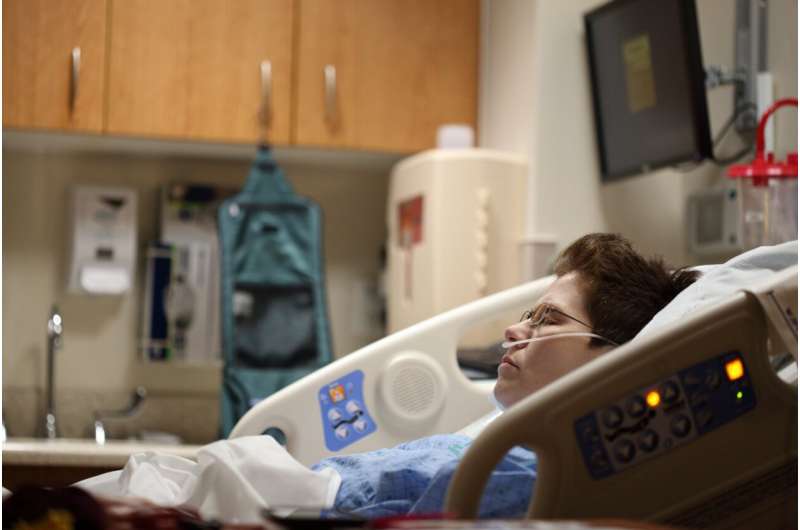This article has been reviewed according to Science X's editorial process and policies. Editors have highlighted the following attributes while ensuring the content's credibility:
fact-checked
peer-reviewed publication
trusted source
proofread
Data from global TAME study supports current management of carbon dioxide levels in cardiac arrest patients

A promising emerging treatment (hypercapnia) for comatose adult cardiac arrest patients has been found to yield similar results to current treatment, in a new study published today in the prestigious medical journal New England Journal of Medicine (NEJM).
Out-of-hospital cardiac arrests (OCHA) cause significant mortality and morbidity, and the study is one the largest trials ever conducted on cardiac arrest patients admitted to intensive care units (ICU).
The Targeted Therapeutic Mild Hypercapnia After Resuscitated Cardiac Arrest (TAME) study showed that maintaining a slightly elevated CO2 level (hypercapnia) for the first 24 hours after a cardiac arrest patient has been resuscitated did not improve neurological outcomes, functional outcomes, or quality of life at six months after the event, and did not impact six-month mortality. Conversely, it did not lead to worse outcomes, either.
Co-lead author, Professor Alistair Nichol, Professor of Critical Care Medicine at UCD School of Medicine, Consultant at St Vincent's University Hospital and Director of the Irish Critical Care-Clinical Trials Network, leads the TAME study in Ireland.
Professor Nichol's doctoral thesis (with Professor of Physiology Paul McLoughlin, UCD School of Medicine, 2007) demonstrated the potential anti-inflammatory effect of hypercapnia and suggested the treatment could be used as a therapeutic intervention in critically ill patients in ICU. Subsequent observational studies in cardiac arrest patients showed that while many doctors follow guidelines and keep the CO2 level normal, it is common to have hypercapnia.
These studies further suggested hypercapnia was associated with improved outcomes, and there are many physiological reasons why this might be so, including increasing blood flow and the previously demonstrated anti-inflammatory effects. The TAME researchers also conducted an earlier smaller trial in ICU patients that suggested that hypercapnia improved outcomes, but recognized the need for a large trial to confirm this finding.
Professor Nichol said, "Our study impacts clinical practice and future cardiac arrest research in a number of ways. Firstly, while we found no additional harm from targeting hypercapnia in these patients, the lack of benefit means there's no need to change practice at present. So, doctors can rest assured that patients aren't missing out if they receive standard practice."
"The second is that while we are somewhat disappointed we haven't discovered a new therapy to improve outcomes for these patients, we demonstrated that these patients can tolerate hypercapnia without causing any harm. This can be important in ICU settings, as this allows doctors to less intensely ventilate patients on breathing machines, which can be helpful in some patient groups."
"Thirdly, it points to a need for further trials and basic science research, as we seem to have a gap in our knowledge and theories about the role of arterial CO2, and how it impacts the body's responses. While hypercapnia didn't improve outcomes in this study, this is not the end of the story for carbon dioxide management in the critically ill."
"Relevant work is now being conducted, to discover which blood markers can determine good outcomes and allow identification of these patients earlier. We've also established a global network of OHCA hospitals and investigators which are now turning to answer the next important question in this patient group."
According to HRB Chief Executive, Dr. Mairéad O'Driscoll said, "These results will help patients who experience cardiac arrest outside hospital as well as supporting clinical practice and decision making in ICU. Research is not just about creating new treatments—it can be as meaningful when results demonstrate that current practice is still valid."
This research demonstrates the the value of HRB strategic investments in a clinical trials ecosystem which is enabling excellent, Irish-based clinicians like Professor Nichol to participate in, or to take a lead role in, large, multi-center international clinical trials.
The TAME randomized controlled trial recruited 1,700 patients from 63 intensive care units in 17 countries, in a uniquely harmonized system that saw them partner with another clinical trial in Sweden. This trial was coordinated from Monash University in Melbourne Australia and from UCD in Ireland.
TAME co-leader Dr. Glenn Eastwood, Monash University, said, "It was a really interesting hypothesis to test, as if it had shown positive results, the change in practice would have been free of cost, beyond those associated with change implementation. But our study provides the strongest evidence to date and indicates no benefit to changing current practice."
Hospitalized comatose adults resuscitated from out-of-hospital cardiac arrest of a presumed cardiac or unknown cause with sustained return of spontaneous circulation were eligible for enrollment. Some 847 patients (49.8%) were assigned to targeted mild hypercapnia and 853 (50.2%) to targeted standard care (normocapnia).
The primary outcome was a favorable neurological outcome defined by a Glasgow Outcome Scale-Extended score of 5 to 8 at six months, obtained by blinded assessors. Secondary outcomes were similarly measured at six months by other relevant, validated scales.
More information: Glenn Eastwood et al, Mild Hypercapnia or Normocapnia after Out-of-Hospital Cardiac Arrest, New England Journal of Medicine (2023). DOI: 10.1056/NEJMoa2214552



















